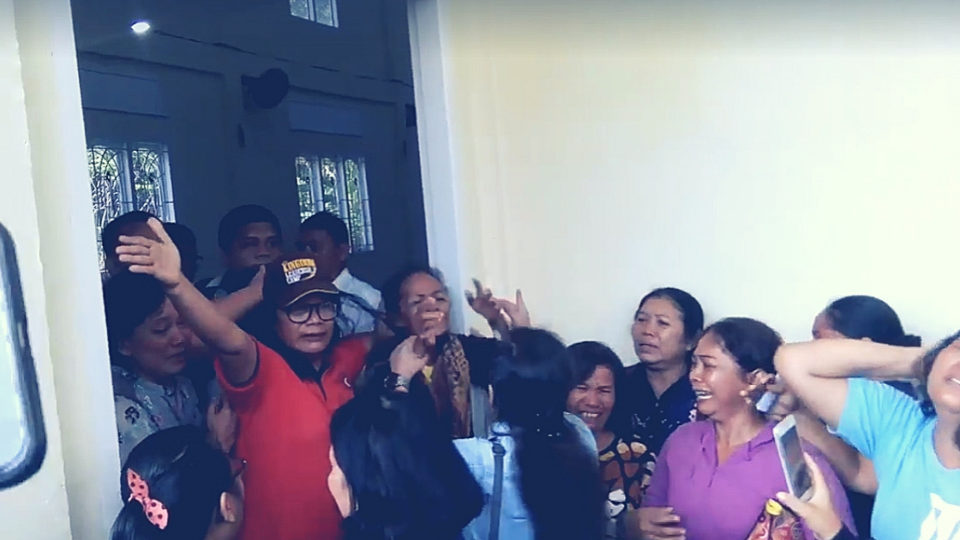There were many tears in the East Sumatran city of Jambi yesterday as authorities sealed off three churches, each of which had been used as houses of worship for well over a decade, for the official reason that they lacked proper permits but which officials admitted was due to pressure
Video and photos of the dramatic scenes were uploaded to Facebook yesterday in two posts by Choky Christianhalomoan Nainggolan, both of which have been shared thousands of times.
https://www.facebook.com/choky.nainggolan/posts/2142133775807084
https://www.facebook.com/choky.nainggolan/posts/2142394052447723
Some of the videos show members of the churches’ congregations crying hysterically as their places of worship are sealed off by members of the city’s Civil Service Police (Satpol PP). Some show congregants trying to sing or pray one last time before they are forced to vacate the buildings.
The three churches that were sealed by the government Thursday morning were Gereja Sidang Jemaat Allah, Gereja Huria Kristen Indonesia Simpang Rimbo and Gereja Methodist Indonesia Kanaan Jambi.
As can be seen in the Facebook posts, the churches were sealed with signs saying that they had been closed for violating various ordinances regarding public order and building permits.
One of the administrators of Gereja Methodist, Oberlin Tampubolon, told KBR that they had not received any prior warning that their house of worship would be closed but suspected it was due to pressure from various groups that had threatened to hold a demonstration today if the churches were not shuttered.
“Nobody tried to resist, but the women of my congregation shed tears. They said: this is not a place of sin, this is where we worship,” Oberlin told KBR on Thursday night.
According to him, the Methodist church was built about 20 years ago and had been in use all of that time and had never had any problems with the local community until now.
Reports suggest that the problems began in July when a letter from various community leaders and citizens living around the churches in Jambi’s Kenali Besar Village wrote a letter of protest to the government demanding that the churches in question be sealed immediately because they were disturbing the community and because they did not have proper building permits (IMB).
In that, the complainants were apparently correct. None of the three churches had proper IMBs from the government, despite having been in use for decades.
But that’s not for a lack of trying. Sinaga, another member of the church, told Tribun that they had tried to apply for an official permit many times but the local government had always denied them.
“They refused but we do not know what the reason was. Even though this is a place of worship. We have never disturbed people from other religions here. We are here to help each other, to love and share with each other,” Sinaga said.
Liphan Pasaribu, the head of the National and Political Unity Agency (Kesbangpol) of Jambi told the media that the sealing was done as the result of a joint decision made on Wednesday by various government agencies and the police, as well as groups local including local chapter of the Indonesian Ulema Council (MUI) and local Religious Harmony Forum (FKUB).
If you’re not familiar with FKUB, the ironically named body derive from a 2006 regulation that requires one to be in every local administration of Indonesia with the primary purpose of approving the construction of houses of worship. However, because the membership of each FKUB is “proportional” to the religious makeup of the population in each area, they essentially give the religious majority veto power over the the construction of houses of worship for religious minorities. Human rights activists argue that these “harmony” forums are one of the major reasons for Indonesia’s growing religious intolerance.
And indeed that seems to be the case here, as Jambi FKUB chairman Husin Abdul Wahab justified their decision to close the churches on the grounds that it could create chaos in the community if they didn’t bow down to the complainants demands.
“Later the consequences could be something undesirable. If [the churches] were not closed as soon as possible, the community would close them themselves. If the community closed them, it would cause a commotion. The news could spread to other countries,” Husin told KBR.
According to Liphan, the Jambi city government promised to find a solution to this problem so that the congregations of the three churches could still worship. But if they remain unwilling to stand up for the rights of the minority against the majority, it’s hard to see that happening.





